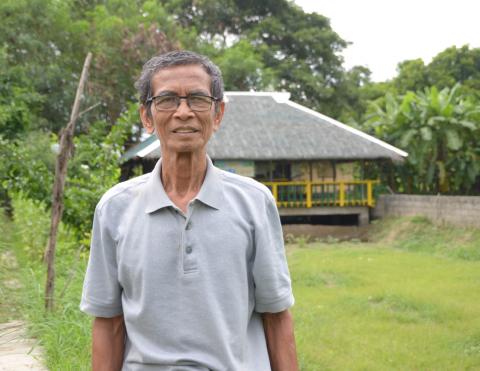It was 2014 when I attended the launching program of a Learning Site in Barangay D. Alarcio in Laoac, Pangasinan. I was amazed when I found out that the farm was owned by Domingo Dulay who had been a professor for 35 years.
I immediately considered him my uncle because I am formerly ‘Ms. Dulay’ and my hometown in Aringay, La Union is where he was born and stayed during his bachelor years. I call him ‘Tatay Doming.’
When he got married, Tatay Doming moved to Barangay D. Alarcio which was known as “paitan”, an Iluko word that means “bitter”. The eventual change in its name also earned the place the label “paraiso” or paradise which is better than bitter.
His parents were farmers which is why farming is not that hard for him. Aside from this, he would always attend training activities of the local government unit especially by the Municipal Agriculture’s Office of Laoac and the Agricultural Training Institute-Regional Training Center (ATI-RTC) I.
Tatay Doming went from teaching to farming. He applied what he learned, and developed his farm until it was shown to ATI and passed as a learning site. The realization came then as he would eventually become a teacher again but, this time, to his colleagues in the farm, through an informal education.
Created by virtue of a Republic Act on March 5, 1980, Laoac is the youngest town of Pangasinan. It has 22 barangays which were all formerly part of Manaoag. The 37-year old town recognized the importance of organic agriculture. With a vision that his people will “eat a healthy diet”, the local executive supports natural farming and even promotes backyard gardening to families in all barangays of Laoac. Households are encouraged to grow 10 different kinds of plants in their backyards which they can also earn additional income from. This vision of the town’s leader was realized with the establishment of MaDoMa Farm as a Learning Site (LS) that practices organic farming. The farm was named after the siblings of Tatay Doming; Marites, Domingo Jr., and Mabel. It was also dubbed “Ang Paraiso sa D. Alarcio”.
The MaDoMa farm has a three-hectare area applied with organic farming practices. It showcases aqua production on tilapia and native shrimp. Livestock, particularly native pig and chicken, duck, sheep and goat are also being raised. Black, red and RC 160 varieties of rice are grown in the farm. Other than these, vegetables like tomatoes, chili squash, string beans, bottle gourd, green leafy vegetables, and other high value crops are also being grown. To complete the farm paradise, fruit-bearing trees like guyabano, mango, calamansi, macopa, banana, among others were planted in between the vegetables.
The established LS is a dream come true for Tatay Doming. He then also wanted to put up multi-purpose building made of indigenous materials that can be used as venue for training activities. This was fulfilled when MaDoMa Farm was elevated into a School for Practical Agriculture under the ATI.
From then on, the farm has become a place for educating famers, youth, students and other stakeholders in agriculture. Visitors come and go at this paradise called MaDoMa.

